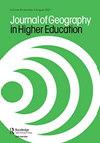生物社会融合科学的工作室教学法
IF 1
4区 教育学
Q2 EDUCATION & EDUCATIONAL RESEARCH
引用次数: 0
摘要
摘要:高等教育的一个关键期望学习成果是,学生了解所学科目的复杂性和背景,以及对所学学科的多学科视角。地理高等教育特别善于实现这一目标。地理学家在跨学科研究领域的发展中发挥了关键作用。如环境研究、文化研究、食品研究和科学技术研究,这些研究增加了对主题学习的兴趣,并提高了对特定主题的无数学科观点的认识。然而,这些努力未能在课堂和整个大学中更广泛地消除孤立的学科思维,从而提出了新的跨学科框架,如“融合科学”。在本文中,我们认为,由于地理学作为一门综合学科的长期作用,应该站在将这一波新的融合研究纳入教育和培训计划的最前沿。我们为研究生提供了一个名为“生物社会工作室”的基于融合的联合指导系列课程的例子,该课程由一位地理学家与生物科学家合作领导。我们确定了促进学习过程的两个关键教学工具——基于工作室的教学和跨认识论的融合——并讨论了其实施的内部和基础设施挑战。本文章由计算机程序翻译,如有差异,请以英文原文为准。
A studio approach to teaching biosocial convergence science
ABSTRACT A key desired learning outcome of higher education is that students understand the complexities and contexts of, as well as the multiple disciplinary perspectives on, the subjects they are studying. Geography higher education has been particularly adept at meeting this objective. Geographers have played key roles in the development of interdisciplinary areas of studies. such as environmental studies, cultural studies, food studies, and science and technology studies, which have increased interest in thematic learning and awareness of the myriad disciplinary perspectives on a particular topic. These efforts, however, have failed to achieve the broader dissolution of siloed disciplinary thinking in classrooms and across the university, leading to proposals for new transdisciplinary frameworks, such as “convergence science.” In this paper, we argue that geography, due to its long-standing role as a synthesis discipline, ought to be at the forefront of bringing this new wave of convergence research into education and training programs. We provide an example of a convergence-based and co-instructed course series for graduate students called the Biosocial Studio, led by a geographer in collaboration with bioscientists. We identify two key pedagogical tools that facilitated the learning process – studio-based teaching and cross-epistemological convergence – and discuss the internal and infrastructural challenges to their implementation.
求助全文
通过发布文献求助,成功后即可免费获取论文全文。
去求助
来源期刊

Journal of Geography in Higher Education
Multiple-
CiteScore
5.80
自引率
9.50%
发文量
29
期刊介绍:
The Journal of Geography in Higher Education ( JGHE) was founded upon the conviction that the development of learning and teaching was vitally important to higher education. It is committed to promote, enhance and share geography learning and teaching in all institutions of higher education throughout the world, and provides a forum for geographers and others, regardless of their specialisms, to discuss common educational interests, to present the results of educational research, and to advocate new ideas.
 求助内容:
求助内容: 应助结果提醒方式:
应助结果提醒方式:


